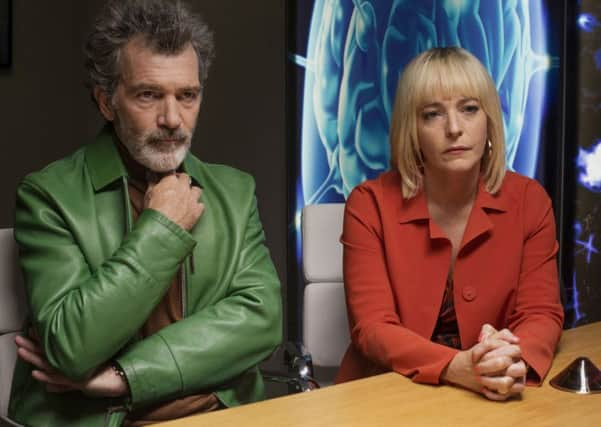Film reviews: Pain and Glory | Crawl | Hail Satan? | Asterix: The Secret of the Magic Potion


Pain and Glory (15) ***
Crawl (15) ***
Hail Satan? (15) ***
Asterix: The Secret of the Magic Potion (PG) *
Marking his 21st feature, Pain and Glory finds Pedro Almodóvar in apparently self-reflexive mode with a movie about an ageing director confronting a creative rut after a prolonged period of ill health. Note the use of “apparently” in the previous sentence, though. While it’s true that the new film – which stars frequent Almodóvar muse Antonio Banderas as the aforementioned filmmaker – does have some autobiographical elements, the veteran Spanish auteur (now in the fourth decade of his career) has never really experienced a creative rut himself… well, not unless you count the odd bit of laurel-resting that came in the wake of winning back-to-back Oscars for All About My Mother and Talk to Her. Consequently, it doesn’t feel all that revealing, certainly not when compared to the lacerating likes of Federico Fellini’s 8½, Woody Allen’s Stardust Memories and Joanna Hogg’s forthcoming The Souvenir. Indeed it mostly comes across as an aesthetically pleasing yet somewhat shallow meditation on creativity that, as the title indicates, explores its lows and highs and uses its protagonist’s illness and drug use as rather obvious symbols for both. The drug use arises as Banderas’s Salvador ponders his breakthrough film on its 30th anniversary. Reaching out to its star, Alberto (Asier Etxeandia), he discovers their much pored-over creative differences stemmed from Alberto’s status as a high-functioning heroin addict (Salvador didn’t agree with Alberto’s interpretation of the character). Wracked with pain from a spinal fusion operation and an as-yet-undiagnosed condition that makes it almost impossible for him to swallow solid food, Salvador starts taking heroin himself, which not only induces lengthy flashbacks to his impoverished childhood with his hard-working mother (played by Almodóvar’s other regular muse Penélope Cruz), but also leads to the film’s most amusing scene when Salvador and Alberto literally phone in a Q&A appearance at an anniversary screening for their film while both are high as kites. Though somewhat specious in its construction (Q&As don’t happen like this), the scene does allow Almodóvar to slyly tap into the naively hedonistic spirit of Spain in the 1980s when Salvador’s film would have been made and the film is at its best in these kinds of subtly subversive moments. But as it builds towards a story of a filmmaker effectively coming to terms with his sexuality and realising it might be both the reason for his fractious relationship with his mother and the key to unlocking his creativity, Almodóvar’s methods become more didactic and dull. Nevertheless, the final shot – which justifies Penélope Cruz’s seemingly incongruous casting – delivers the sort of elegant rug-pull that reminds us why Almodóvar is as revered as he is.
Every summer cinemas are dominated by ever more elaborate franchise films and every summer or two some enterprising genre filmmaker responds by making a water-based B-movie as some sort of unironic, misguided homage to Jaws. A few years ago it was the rubbish shark movie The Shallows. Then came rubbish shark movie 47 Meters Down. This year’s version is Crawl, which forgoes sharks altogether in favour of some pretty vicious and agile alligators, but otherwise conforms to the same formula by having a resourceful heroine with family issues forced to confront her personal demons while battling some aquatic behemoth for survival. The best that can be said about Crawl is that director Alexandre Aja (Piranha 3D) doesn’t mess around with his apex predators. From the moment Kaya Scodelario’s Florida-based championship swimmer finds herself stranded in her old family home while checking on her estranged father (Barry Pepper) in the middle of a typhoon, it’s no time at all before the snappy inhabitants of a nearby wildlife preserve take advantage of her flooded neighbourhood and start treating it like an open buffet. The early shocks are effectively handled by keeping Scodelario and Pepper trapped in their flooded basement as the tide rises and their guests get hungrier. But as the storm worsens and the feats of superhuman strength required to extricate themselves from the situation become more pronounced, the film loses whatever B-movie purity its premise may have promised.
Advertisement
Hide AdIn Hail Satan?, documentary maker Penny Lane explores the rise of the Satanic Temple, a pseudo devil-worshipping religion in the US that began in 2013 as a kind of satirical agit-prop performance art troupe convened to protest the American Right’s weaponisation of Christianity. Since then, though, it has evolved into a more serious protest movement under the guise of an actual religion, one that now has more than 50,000 followers, multiple affiliated chapters across the country, and its own hierarchical structure, scholars and legal team. The film doesn’t really dwell on whether or not the Satanist cover story aspect attracts gullible lovers of Lucifer, but it is pretty entertaining when looking at how effectively its followers use the tenets of religious faith in their ongoing mission to expose the hypocrisy of the Church and its affiliated politicians while fighting to ensure the separation of church and state remains a constitutionally enshrined reality.
Given that French comic-strip character Asterix is celebrating his 50th anniversary this year (as well as the 40th anniversary of his first English-language publication), it’s probably no surprise that there’s a new film version hoping to capitalise. Sadly, Asterix: The Secret of the Magic Potion is unlikely to hook a new generation of fans given its substandard CG animation, its rubbish Harry Potter-riffing plot, and the fact that the title character barely features.